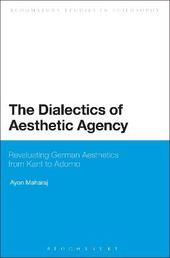
|
The Dialectics of Aesthetic Agency: Revaluating German Aesthetics from Kant to Adorno
Hardback
Main Details
Description
This study examines how key figures in the German aesthetic tradition - Kant, Schelling, Friedrich Schlegel, Hegel, and Adorno - attempted to think through the powers and limits of art in post-Enlightenment modernity. Ayon Maharaj argues that the aesthetic speculations of these thinkers provide the conceptual resources for a timely dialectical defense of "aesthetic agency"- art's capacity to make available uniquely valuable modes of experience that escape the purview of Enlightenment scientific rationality. Blending careful philosophical analysis with an intellectual historian's attention to the broader cultural resonance of philosophical arguments, Maharaj has two interrelated aims. He provides challenging new interpretations of the aesthetic philosophies of Kant, Schelling, Schlegel, Hegel, and Adorno by focusing on aspects of their thought that have been neglected or misunderstood in Anglo-American and German scholarship. He demonstrates that their subtle investigations into the nature and scope of aesthetic agency have far-reaching implications for contemporary discourse on the arts. The Dialectics of Aesthetic Agency is an important and original contribution to scholarship on the German aesthetic tradition and to the broader field of aesthetics.
Author Biography
Ayon Maharaj is Assistant Professor in the Departments of Philosophy and English at Ramakrishna Mission Vivekananda University in West Bengal, India. He was educated at the University of California, Berkeley, Humboldt-Universitat zu Berlin, and the University of Oxford.
ReviewsHow can we both be enraptured and shaken by the experience of art and yet also continuously suspicious of art's promises, seductions, and potentially dangerous uses? Is this complex attitude even coherent, let alone fruitful? By tracing and evaluating the stances on art of Kant, Schelling, Schlegel, Hegel, Kierkegaard, and Altieri, Ayon Maharaj arrives at a compelling account of the work of art as a haunting force that eludes both reduction to any definite message and dismissal as an empty entertainment. In this way, Maharaj brings the tradition of German aesthetic theory strikingly to life in relation to current plights and possibilities of human life in culture. -- Richard Eldridge, Charles and Harriett Cox McDowell Professor of Philosophy at Swarthmore College, USA Maharaj's book offers consistent and intense philosophical analyses of the basic arguments shaping the aesthetic theories of Kant, Schelling, Schiller, Nietzsche, and Adorno. But Maharaj also pursues more elaborate ambitions that make its path through those arguments a compelling statement of what might be possible for this mode of self-reflection. Because aesthetics has our pleasure in imagined objects at its core, these philosophers used these inquiries to establish powers of human agency that could find a home nowhere else in Enlightenment philosophy. One might imagine aesthetics charged with the role of a new theology articulating the project of restoring aspects of the sacred within a disenchanted world. Because Maharaj elaborates so compelling a sense of this shared project, it seems as if the commentator ultimately has the task of composing a dialectical structure articulating how the mind finds a satisfying home in a most unsatisfying world. It is no accident that he concludes with Adorno. -- Charles Altieri, Rachel Stageberg Anderson Chair in the Department of English at the University of California, Berkeley, USA The real strength of Maharaj's account comes in the patient and detailed narrative he develops of the infuence of this aporetic reading of Kant, from Schiller through to figures as late as Theodor Adorno ... develops a number of original and searching accounts ... the author persuasively develops a fresh reading of Hegel's philosophy as based on a dialectical development and appreciation of Schelgelian irony ... This book succeeds admirably in articulating a fresh and coherent genealogy of post-Kantian aesthetics. Its impressive range has not prevented its author from producing incisive and original work on all the philosophers it incorporates. -- Owen Hulatt, University of York * British Journal for the History of Philosophy * An original and meticulously crafted account of aesthetic agency in its conceptual evolution from Kant to Adorno . . . What sets this work apart from comparable works exploring the art-agency relation from Kant onward is that it deftly plays between antithetical attitudes toward the notion of aesthetic agency. . . The work presents a historically grounded analysis of how these competing tendencies of art -- enchantment and disenchantment -- stand in various stages of dialectical interdependence with one another. . . One has to commend this work as a powerful and timely defense of aesthetic agency. It is a welcome line of argument for those of us who can neither naively ascribe to art the power of spiritual redemption nor cynically reduce art to the purpose of entertainment, pleasure, or emotional catharsis. * Notre Dame Philosophical Reviews, Jason M. Miller, Warren Wilson College * An impressive and detailed survey of the different ways in which the power of art to exceed scientific reason is theorized in the German aesthetic tradition from Kant to Theodor W. Adorno. * Oxford Bibliographies Online *
|